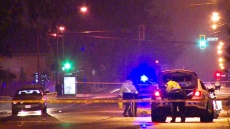OTTAWA — The federal government is planning to open up a database of more than 9,000 files to allow Inuit families to learn about relatives lost during the tuberculosis outbreaks of the mid-20th century.
Prime Minister Justin Trudeau, who is travelling this week to Iqaluit, is expected to outline how the database will work Thursday as he delivers an apology on behalf of the government for the mistreatment of Inuit during the epidemics.
The database will, for the first time, help Inuit families in northern Canada contact representatives within their land claim organizations who can help conduct an in-depth to determine what happened to their relatives.
The aim is to help locate the gravesites of family members who were transported to southern Canada for TB treatment between the 1940s and the late 1960s.
"We know that we won't be able to find everyone," said one source familiar with the announcement, who spoke on condition of anonymity in order to talk about matters that have yet to be made public.
The documents in the database could lead some searchers to a dead end, "but some might lead to actual gravesites."
The apology and database are part of a process called Nanilavut, which means "let's find them" in Inuktitut.
The Canadian Public Health Association has estimated about one-third of Canada's Inuit population became infected with TB during the outbreaks. Many of those who died were never returned to their families but were instead buried in unmarked plots.
The search for relatives began in 2008 when a family in Nunavut reached out in hopes of finding a lost loved one who was taken south for TB treatment.
Nunavut Tunngavik Inc., the organization that speaks for Inuit in Nunavut, contacted the federal government, which soon afterward began to uncover more information about other cases of Inuit who had died but whose bodies were never returned north.
A working group was formed and since then, the four agencies representing Inuit in Canada have been compiling as much information as they could find.
The database now contains more than 9,000 records including hospital documents and transport records, but much of the information is incomplete.
"Some (of the documents) are lists of names; some could be duplicates or multiple records for the same person with names spelled in different ways," said another source, who also spoke on condition of anonymity in advance of the public announcement.
"In some cases there will be names. In some cases people will be identified by their "E" numbers."
The "E" numbers — or sometimes "W" numbers — were what federal authorities at the time used to identify individual Inuit, rather than using their names.
"This is sort of another part of the inhumane treatment that Inuit suffered at that time," said the source. "They were given these numbered discs and that was how they were known — not by their names, but by their numbers."
There are four northern land claim regions involved in the project, in the territory of Nunavut, Nunavik in northern Quebec, Nunatsiavut in northern Labrador and the Inuvialuit settlement region of the Northwest Territories.
The database will be open to family members with documents identifying their loved ones.
It is hoped that, once families come forward, the database will grow and potentially help other families who don't have documents available to them to begin searching for missing relatives.
Over the last decade, a number of groups and individuals have tried to identify Inuit who died in southern Canada while receiving treatment for tuberculosis.
In 2010, members of the United Church in the Mohawk community of Kahnawake, southwest of Montreal, erected a memorial stone after identifying 15 Inuit buried in a Protestant cemetery.
They ranged in age from two months to 74 years old and records identified most of them by only one name.


